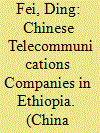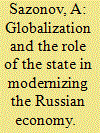| Srl | Item |
| 1 |
ID:
178891


|
|
|
|
|
| Summary/Abstract |
This article examines Chinese engagement in Ethiopia's telecommunications sector. It argues that while theories of developmental state and global production networks contribute important insights on the roles of state agency and inter-firm relations in the rise of global lead firms from East Asia, they are insufficient to interpret the recent overseas ventures of Chinese companies in Africa. A case study of one flagship Chinese telecommunications company in Ethiopia advances the existing literature by highlighting the influences of host government intervention and inter-firm competition in shaping firms’ local operations. Specifically, this article analyses a myriad of changes in the case company's organizational structure and business practices in response to increased market competition administered by the Ethiopian government. Findings reveal that despite benefiting from official inter-state cooperation, Chinese overseas companies are neither static nor merely state-driven players but are flexible in adjusting strategies to improve their competitiveness in the local market.
|
|
|
|
|
|
|
|
|
|
|
|
|
|
|
|
| 2 |
ID:
136065


|
|
|
|
|
| Summary/Abstract |
Net interest margin (NIM) is an indicator of the level of efficiency of financial intermediation by banks. This study analyses the determinants of NIMs of domestic banks of Sri Lanka for the period of January 2002 to March 2011 based on the model developed by Ho and Saunders and its extensions using panel regression. Sri Lankan banks are inward looking in setting NIMs as operating costs, credit risk, risk aversion, non-interest income and capital adequacy requirements are determinants. Market competition, other regulations on banks, risk arising from the volatility of market prices and macroeconomic variables do not have a significant impact on the determination of NIMs.
|
|
|
|
|
|
|
|
|
|
|
|
|
|
|
|
| 3 |
ID:
106120


|
|
|
| 4 |
ID:
176708


|
|
|
|
|
| Summary/Abstract |
Why do some governments adopt policies to mitigate climate change while others do not? In this study, I illustrate the importance of industrial organization in shaping prospects for climate mitigation policy. Using a difference-in-differences analysis, I show that U.S. states which adopt electricity market liberalization laws are subsequently fifteen to forty-three percentage points more likely to adopt a renewable portfolio standard and fifteen to thirty percentage points more likely to adopt a cap-and-trade program. I argue that the forced reduction in market share of incumbent utilities associated with market liberalization laws undermined the political dominance of legacy producers and facilitated the growth of independent power producers (IPPs). Following liberalization, I show how these firms disproportionately benefited from the development of renewable energy, and how their growth in market share corresponded with a rise in political activity, thus offering a countervailing industrial interest-group influence to legacy producers. These findings demonstrate the importance of industrial organization in shaping long-run prospects for climate mitigation. More generally, this study sheds light on how government interventions can shape industrial interest-group dynamics.
|
|
|
|
|
|
|
|
|
|
|
|
|
|
|
|